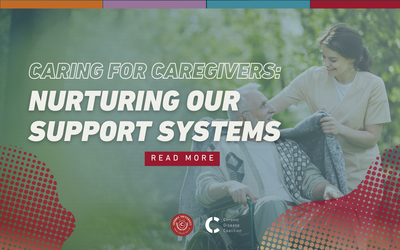
CDC Ambassador Christina Thielst relied on her high school daughter for care during the peak of her chronic illness.
Mother Polly Peters’ full time job is caring for her three young boys with rare diseases – and she has no days off.
Angel Aid Founder Cristol Barrett O’Loughlin lost three older brothers to a rare genetic disease and now shares her family’s story with the world to create change.
National Alliance for Caregiving Program Director Yadira Montoya is a professional advocate and is preparing to be a full-time caregiver as her parents age.
These are just a small glimpse into the stories of patients, caregivers and advocates who all work to support the lives of chronic disease caregivers each and every day.
At the Chronic Disease Coalition, we fight for patient-centered laws and policies, but recently, we took a step back to shine a spotlight on the lives of caregivers and their invaluable role to the chronic disease community. Caregivers are essential to the well-being of chronic patients. They deliver necessary mediations, physically pick up patients when they are down, provide transportation to and from doctor’s appointments and so much more. They are heroes to so many people and we must advocate for them as such.
When we connected with this group, they all shared their unfiltered advice for how to not only be a better caregiver, but also how others can support caregivers in their day-to-day work. This powerful conversation brought laughs, tears and many learnings.
Here’s a look at what we discussed…
Embrace Self-Advocacy:
As a caregiver or patient, it is essential to advocate for yourself or your loved one within the healthcare system.
Christina shared how advocating for both herself and her daughter (caregiver), helped her journey. “I would sit [doctors] down and have them understand what the process was and how both of us fit into that process so that together we could be more effective."
She highlights that patients’ needs to communicate needs clearly to healthcare professionals, ensuring they understand your unique circumstances. Educate yourself about the condition and treatment options, and don't hesitate to ask questions or seek second opinions. Remember, you are an active participant in the care process.
Seek Emotional Support:
Caring for someone with a chronic illness can be emotionally draining. Find a group, or a person who can support your emotional needs – whether that’s a friend or a trained professional.
Polly shared the benefit of regular walks with her friends. Even if they are not going through the same caregiving tasks, just having someone to vent to can be very useful.
Prioritize Self-Care:
We’ve all heard the popular airplane instructions... “Put your oxygen mask on before assisting others.” The same goes for caregivers. Take care of yourself, so you can better take care of those around you.
Cristol explains that "If you're not available to other people in your life and you're not sustaining yourself emotionally and physically, then you're not going to be there for those that you're caregiving and loving for as well."
Taking care of yourself is not selfish; it is essential for your well-being and sustaining your energy. Make time for recharging with activities that bring you joy and relaxation, whether it's taking a walk, reading a book, or enjoying a hobby. Set boundaries and ask for help—others may be standing by and ready to help, but not sure how.
Utilize Available Resources:
Explore resources and organizations dedicated to supporting caregivers and patients.
Yadira reminded us that patients and caregivers can find support from professionals like the National Alliance for Caregiving (NAC). The NAC offers valuable information, research, and advocacy initiatives. Additionally, consider reaching out to disease-specific organizations that can provide guidance, support, and access to relevant resources.
MOVING FORWARD
Unfortunately, the laws that support caregivers are limited. Currently, the best system is the family and medical leave act (FMLA). According to The National Alliance for Caregiving, FMLA entitles eligible employees up to 12 weeks of unpaid leave each year to recover from their own serious health conditions or to care for a newborn, a newly adopted child, or a seriously ill family member. However, up to 40 percent of people in the workforce are not eligible for leave under FMLA—and many cannot afford to take unpaid leave. Many policymakers are working to find solutions that offer paid caregiving options, but nothing has been solidified.
As we continue to work for federal policies that financially support caregivers, you can contact your state legislators to find out if your state offers paid leave. For support reaching out to your legislators, contact CDC Policy Director, Nathaniel Brown.
This topic and these stories are impossible to summarize in one blog. To see the full recording and learn more about the importance of caregiving, watch the full conversation here.